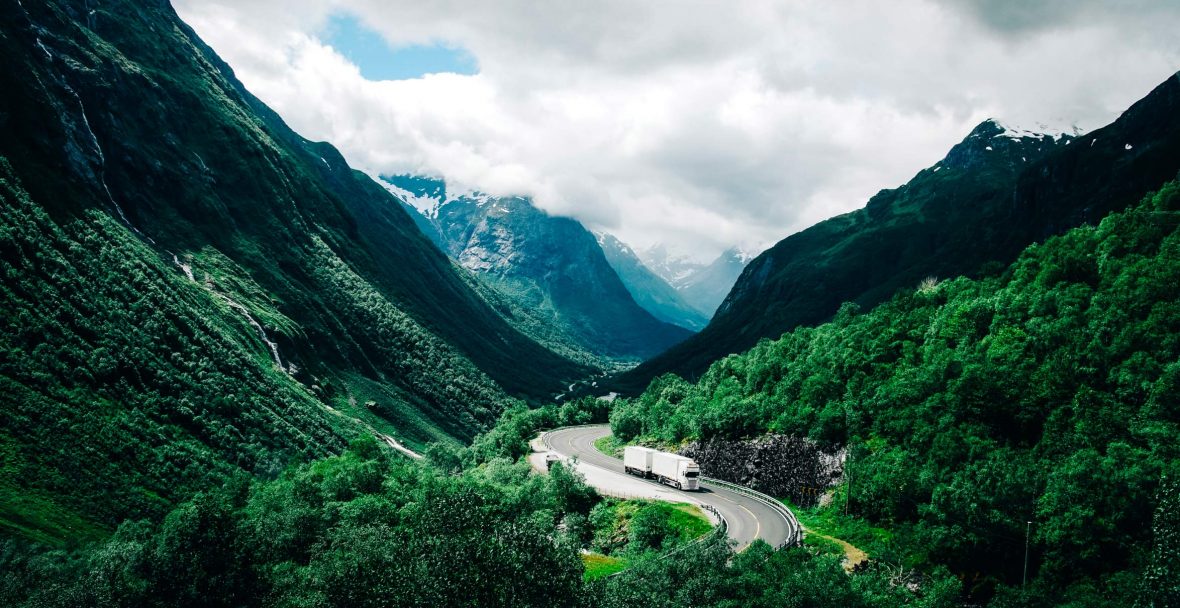Making zero
emission freight
a reality
Discover our recommendations to make a shift towards
zero- emission vans and trucks

About
Trucking and road freight in Europe is changing, fast. How can each country manage the challenges of ‘going green’ and decarbonising without compromising their fleet’s efficiencies and existing commitments?
The National Trucking Platforms are round-table in each country working towards constructive solutions to decarbonise freight transport in Europe over the next 10 years.
The decarbonisation of the road freight sector is one of the main challenges for Europe in the next decade. We believe that the solutions should come from the ground up. That s why the National Truck Platforms are gathering key transport and logistics actors -businesses, public stakeholders, Academic and NGOs- in six European countries to come up with concrete recommendations on what is required to speed up the decarbonisation of the sector.
Why decarbonizing road transport is key:
- Heavy duty vehicles represent ~1% of the total EU fleet, however they are responsible of more than 26% of the emissions of road transport.
- Trucks represent ~5% of the total EU emissions.
Platforms
Discover the
platforms
Truck platforms have been created in six European countries:
- Spain
- Italy
- Poland
- Germany
- France
- United Kingdom
The Platforms’ members include truck makers, industry associations, logistics companies, grid operators and other relevant stakeholders.
Each platform has been discussing the potential technology pathways for decarbonising freight, and the different costs and benefits associated with this shift. Another key element is the charging infrastructure: the Platforms have identified the infrastructure requirements and costs at a national level.
Spain
14 members
Italy
9 members
Poland
14 members
Germany
7 members
France
5 members
United Kingdom
1 members
Spain
In Spain, 97% of total freight transport is by road, making it one the countries with the highest volumes of road freight and with the highest daily mileage in the EU.
Spain is the third country in the EU (after Poland and Germany) by road freight transport volume (in million tons-km). In Spain and Poland more than 50% of the fleet travels over 500km a day and the vast majority of vehicles still runs on fossil fuels..
It’s not surprising then that transport is the sector that contributes most to greenhouse gas (GHG) emissions in Spain, accounting for 29.1% of total emissions in terms of CO2 equivalent in 2019.
The sector is very atomised: companies are in majority small and medium enterprises (99%), employing 79% of the sector’s workforce and registering 72% of its turnover. Half of the service companies of heavy-duty vehicles have only one authorized vehicle. The freight sector’s contribution to Spain’s GHG emissions is significant: more than 8% came from heavy goods vehicles (trucks) and above 1% from light duty vehicles (vans), the vast majority of which still run on fossil fuels. For comparaison, the whole transport sector accounted for 29.1% of total emissions in terms of CO2 equivalent in 2019.
The Spanish Truck Platform members include:
Logistics, mobility sector & retailers
- IRIZAR e-mobility, bus and truck maker
- IKEA Spain, furniture retail company
- Grupo Sesé, transport company
- Asociación Empresarial para el Desarrollo e Impulso de la Movilidad Eléctrica (Aedive), the industry association for the development and promotion of the electric vehicle, member of AVERE Europe)
- Asociación del Transporte Internacional por Carretera (ASTIC), the largest Spain’s hauliers association, focused in long-haul and international freight
Energy sector
- Iberdrola, electric utility company
- Siemens, an industrial manufacturing company
- Albufera Energy Storage, a company with strong expertise in batteries
- Centro Nacional del Hidrógeno (CNH2), Spain’s National Centre for Hydrogen
NGOs and Academia
- Fundación Ecología y Desarrollo (Ecodes), NGO
- T&E Spain, NGO
- Universidad de Zaragoza, one of the leading universities in Spain
Spanish Ministries
- Spanish Ministry of Transport, Mobility and Urban Agenda (MITMA)
- Institute for the Diversification and Saving of Energy (IDAE), institute within the Ministry for the Ecological Transition (MITECO)
Italy
In Italy, 55.9% of domestic market goods travel by road, more than rail, sea and air transport combined. The total number of vehicles on the road in 2019 for freight transport totalled 4.2 million, with the vast majority running on diesel fuel. The challenge for the Italian transport industry is the age of the vehicle fleet, with more than 60% of vehicles over 10 years old and around 30% over 20 years old. In terms of size, there are 87,460 road transport companies active in Italy, with a total of 328,627 employees (2018).
The Italian Truck Platform is coordinated by Kyoto Club and includes the following members:
- ABB
- Confartigianato Imprese
- Confartigianato Trasporti
- SCANIA
- MOTUS-E
- Politecnico di Milano
- Tesla
- Transport & Environment Italia
- UPS Italia
Access the summary report in IT and EN and the recording of the launch.
Poland
The Road transport sector is crucial for the Polish economy. With over 1 million medium and heavy commercial vehicles registered in Poland the country has the largest fleet of trucks out of all EU member states. Simultaneously Polish transport companies have the largest share of almost 30% in international road transport in the EU. The transition towards electric trucks and vans will therefore not only have a lasting impact on the country’s greenhouse gas emissions reduction but it will also impact the European transport sector.
The Polish Trucks Platform is coordinated by FPPE (Fundacja Promocji Pojazdów Elektrycznych) with Cambridge Econometrics, supported by national partner KOBIZE, carrying out the research and analysis. The Polish platform has 14 members :
Logistics, mobility sector & retailers
- TLP
- InPost
- NoLimit
- Amazon
- IKEA
Vehicle manufacturers
- MAN
- Volvo
- Rafako E-Bus
- Scania
Energy sector
- Orlen
- PSE
Polish Ministries
- Ministry of Climate
- Ministry of Infrastructure
- Institute for Environmental Protections
Access the full report (PL) of the platform and the summary (EN).
Germany
With a 73 percent share of transportation services, trucks are the backbone of freight transportation in Germany and this market share is expected to remain stable by 2030.
The entire logistics sector in Germany employs 3.2 million people and generates total turnover of 272 billion Euros (2020).
In terms of distance covered, the sector is forecasted to grow by about another 29 percent by 2030 over 2010 levels, to 607 billion ton kilometres. Interestingly, nearly 80 percent of freight volume on roadways is performed on routes of 150 kilometres.
The German National Truck platform has decided to focus on a case study to evaluate what is needed to electrify regional deliveries of the food industry in Berlin metropolitan area. The idea is to assess how to substitute diesel trucks by electric trucks in REWE logistics and what it requires for this shift:
- Usage of the electric trucks and range
- Truck weight, size classes and body types
- Charging infrastructure
- Blockers to the shift to local zero emission delivery
The project has been monitored by an advisory board comprised of distinguished experts from the German federal government and key organizations in the field of transport policy.
Partners of the platform:
Logistics, mobility sector & retailers
- REWE Group
Vehicle manufacturers
- MAN Truck & Bus
Energy sector
- Stromnetz Berlin
- Allego
German assembly
- Senate Administration of Berlin
Academia
- Fraunhofer Institute for System and Innovation Research
Other industry partner
- Compleo
The project has been monitored by an advisory board comprised of distinguished experts from the German federal government and key organizations in the field of transport policy.
Advisory board:
- Federal Ministry for the Environment, Nature Conservation and Nuclear Protection (BMU)
- Federal Ministry of Transport and Digital Infrastructure (BMVI)
- International Council on Clean Transportation (ICCT)
- Nature and Biodiversity Conservation Union (NABU)
- German Energy Agency (dena)
- Agora Verkehrswende
Access the executive summary (EN) and the full report (DE) of the platform.
France
Road freight transport accounts for 87.1% of domestic land traffic, i.e. 322.3 billion tonne-kilometres travel in metropolitan France. More than 92% of this traffic is carried out by heavy goods vehicles over 3.5 tonnes. Road freight accounts for 351,400 employees (2015) and €42.6 billion in turnover (2014).
The French Platform on Decarbonised Logistics is structured around a research project that aim to identify key barriers to the decarbonisation of freight transport and define a roadmap for electrifying intra-regional freight flows. By focusing on a large city, the study will be able to handle the challenges associated with large trucks (intra-regional transport) and vans (urban logistics). A truck manufacturer, a carrier, a metropolitan area, and a network operator will develop a concrete plan to enable the transporter’s transition to electric trucks. Financial, economic, technological and urban planning obstacles will be identified, analysed and concrete policy recommendations will be made at local and national level.
Logistics, mobility sector & retailers
- Delaunchy (Carrier)
Vehicle manufacturers
- Volvo trucks / Renault Trucks
Energy sector
- Enedis, utility partner
Public stakeholders
- Grand Lyon Métropole
NGO and Academia
- Transport and Environment
Publication of the roadmap is expected in Q2 2022.
United Kingdom
In the United-Kingdom, trucks account for 16% of domestic transport emissions. Road haulage accounts for around 8 in every 10 tonnes of freight movements – two thirds using larger articulated trucks. New articulated trucks bought in the UK are on average less efficient than those purchased in Eastern Europe and emissions have been declining only slowly. To date the principal efforts to decarbonise freight have come through low blends of biodiesel. However, the UK Government has taken the world leading step to end the sale of most new rigid (less than 26 tonne) trucks by 2035 and larger (44 tonnes) articulated trucks by 2040. It is expected to use a Zero Emission Truck Mandate to drive the shift to zero emission freight movement.
The Platform for Zero Emission UK Trucking, a grouping of businesses committed to the rapid electrification of trucks in the UK, has been set up in 2021. The Platform will gather supportive business voices calling for an ambitious phase-out of diesel trucks, including intercity trucks less than 44 tonnes.
The Platform will come up in 2022 with recommendations on the feasibility of electrifying urban trucks less than 26 tonnes, taking into account total cost of ownership and charging requirements.

Contact
Reach out to know more about the National Truck Platforms.
For further questions about our work or for press enquiries,
please contact us.